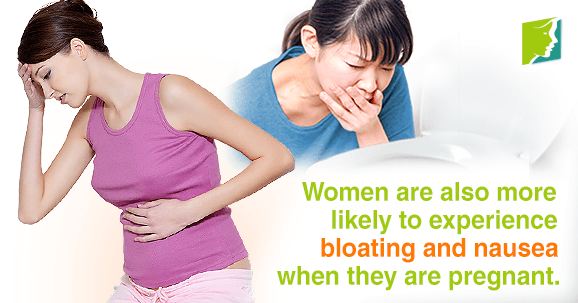Bloating is a build-up of gas in the body that can lead to a temporarily larger abdomen and increased wind. It is more often than not related to dietary habits and is easily reversed. Nausea, on the other hand, is a condition that can be caused by any number of things, so treatment is not always so straightforward. Although bloating and nausea are separate conditions, they can sometimes be linked. Read on to discover some of the situations in which bloating and nausea might be connected, and when you should look for separate solutions.
Yes
Bloating and nausea are both common symptoms of indigestion. These are often accompanied by both heartburn and discomfort in the upper abdomen. Indigestion is not serious and will not normally require medical attention, although it can be uncomfortable. The most effective way of beating the condition and ridding yourself of its symptoms is to change your eating and drinking habits.
Women are also more likely to experience bloating and nausea together when they are pregnant. Although not all women will have both or even either of the symptoms, if you do have them both, then this could be an indicator of pregnancy. This is even a possibility for older women who are going through menopause, and so age should not be seen as a barrier to pregnancy until you have not received a period for one entire year.
No
One of the most common reasons for nausea in adults is gastroenteritis, more commonly known as food poisoning. Bacteria or a virus in contaminated food or drink can sometimes cause the stomach or intestines to become inflamed, and this can lead to unpleasant symptoms, such as nausea, vomiting, and even diarrhea. A food allergy can induce similar symptoms, in addition to swelling and wheezing.
However, nausea can also point to more serious conditions, such as kidney stones, which require medical attention. For this reason, it is important not to ignore nausea if it goes on for too long.
Bloating is normally the natural result of eating too much, eating too fast, or eating the wrong foods. In this case, it will not be accompanied by nausea and is therefore nothing to worry about. You might want to talk to a physician to find out how to reduce it, but it will not normally be an urgent problem.
Bloating and nausea are usually unconnected, but when they come together they can indicate certain things. The two afflictions do have other causes than those listed above, but this article has provided a list of the most common reasons that bloating and nausea will occur. Nausea is generally a more worrying symptom than bloating, so if this is chronic, then it should be dealt with as soon as possible.
Follow the link below for more information on dealing with menopausal bloating and nausea.
Sources
- National Health Service UK. (2014). Gastroenteritis in adults. Retrieved October 21, 2014, fromhttp://www.nhs.uk/conditions/gastroenteritis/Pages/Introduction.aspx
- National Health Service UK. (2013). Nausea and vomiting in adults. Retrieved October 21, 2014, fromhttp://www.nhs.uk/conditions/vomiting-adults/Pages/Introduction.aspx
- National Health Service UK. (n.d.). Signs and symptoms of pregnancy. Retrieved October 21, 2014, fromhttp://www.nhs.uk/conditions/pregnancy-and-baby/pages/signs-and-symptoms-pregnancy.aspx#close
- National Health Service UK . (2014). Symptoms of indigestion. Retrieved October 21, 2014, from http://www.nhs.uk/Conditions/Indigestion/Pages/Symptoms.aspx
- National Institutes of Health. (2014). Food Allergy. Retrieved October 21, 2014, from http://www.nlm.nih.gov/medlineplus/foodallergy.html




